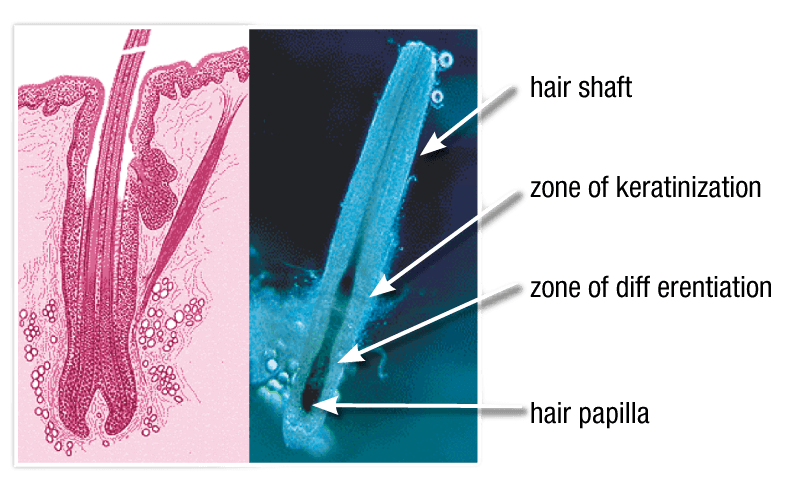Efficacy of the caffeine complex in the treatment of androgenetic alopecia
Conducted at the Clinic of Dermatology and Dermatological Allergology of Friedrich Schiller University in Jena, Germany
Short version of a report on studies performed in a hair organ culture model (HOCM) at the Clinic of Dermatology and Dermatological Allergology of Friedrich Schiller University in Jena, Germany (Dr. T. W. Fischer, Prof. Dr. P. Elsner)
Hereditary hormonal (androgenetic) hair loss is still a problem affecting numerous men; to date no satisfactory solution has been found. The cosmetic and pharmaceutical products available on the market vary greatly with respect to their degree of efficacy and adverse reactions.
Since a genetic predisposition to hereditary hormonal hair loss cannot be changed, current therapeutic strategies aim at applying effective agents to the hair roots to prevent the effects of the genetic predisposition. Androgenetic hair loss is thus a condition requiring long-term treatment, during which special attention must be paid to the safety and tolerability of the products used. Against this background, substances that cause practically no adverse reactions and act independently of hormonal mechanisms represent a promising therapeutic alternative.
Diagram of a real hair follicle in the hair organ culture model

Diagram of a real hair follicle in the hair organ culture model
Since testosterone is an important factor in the development of androgenetic alopecia, the situation in which testosterone acts on human hair was reproduced in a hair organ culture model.
Hairs were extracted from human scalp biopsy specimens and cultivated for 6-10 days under laboratory conditions. To obtain results in the HOCM that would be transferable to a high degree to the real-life situation of patients with androgenetic alopecia, the study group took scalp biopsies from young men with beginning hereditary hormonal hair loss. Approx. 20-30 hair follicles were extracted from each scalp specimen. A total of approx. 600 hair follicles were available to the study team.
The results showed that the growth of hair roots under the influence of testosterone was distinctly weaker than the growth of hair roots in the control without testosterone (Cf. diagram); furthermore, the activity of the hair roots ceased earlier than normal. These findings correlate with the observation that testosterone or its metabolite causes the hair roots to enter the resting (or telogen) phase prematurely. During the study the inhibitory effect of testosterone was shown by the fact that hair growth in the batch containing testosterone was between 17% and 40% less in comparison with growth in the control consisting of pure nutrient medium.

Suppression induced by testosterone
The studies carried out to find new effective mechanisms against androgenetic alopecia yielded the surprising result that caffeine can cancel the undesirable effects of testosterone in the skin. These results showed that, in addition to the generally expected effect of improving circulation, caffeine had other effects that had previously been overlooked. In the wake of these reports, caffeine was applied to the hair follicles of men with beginning hereditary hormonal hair loss and the results were analysed.

Stimulation caused by caffeine
The study results revealed that a distinct increase in hair follicle growth, amounting to up to +46% in individual batches, was achieved with caffeine. The stimulatory effect of caffeine on blood circulation was not relevant in the hair organ culture model, since the HOCM operates independently of the vascular system. For this reason, any stimulating effect of caffeine observed in the model must be due to caffeine acting directly on the metabolism of the hair root.
The measurement of total culture time in the HOCM yielded further evidence that caffeine exerts a positive effect on the vitality of hair roots. The hair follicles exposed to caffeine under culture conditions exhibited a 37% longer lifetime in comparison with the control.
After the growth-suppressing effect of testosterone and the growth-stimulating effect of caffeine were demonstrated in individual batches containing testosterone or caffeine, respectively, growth trials were carried out in a hybrid model containing both testosterone and caffeine and testosterone in combination. In particular, the researchers wanted to find out whether caffeine was able to cancel the suppressive effect of testosterone.
The study results show that caffeine is able to cancel the suppression of hair growth induced by testosterone and even to stimulate hair growth beyond the normal level. The studies carried out in the HOCM have thus confirmed that caffeine is able to neutralise the undesirable effects of testosterone, a substance held responsible for the shutdown of hair follicle activity in patients with androgenetic alopecia. Following exposure to caffeine, the hair follicles return to a balanced state equivalent to the state of the untreated hair follicles in the control solution.

Caffeine cancels the effect of testosterone
Summary
The results showed, furthermore, that caffeine may be a potent growth-stimulating agent suitable for long-term therapeutic or prophylactic treatment of patients with a genetic predisposition to androgenetic alopecia since, under laboratory conditions simulating hair growth conditions in men with hereditary hormonal hair loss, a significant stimulating effect on hair follicle growth was demonstrated compared to controls.
PUBLISHED STUDY
T. W. Fischer, U. C. Hipler, P. Elsner, Int. J. Dermatol. 2007, 46 , 27–35.
